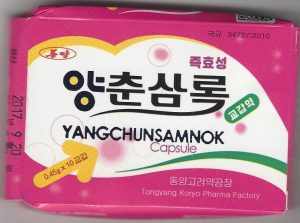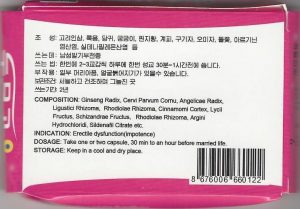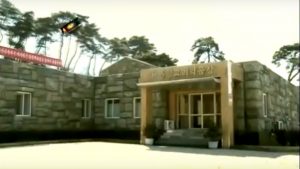UPDATE 32 (2012-1-27): According to an article in the New York Times, inter-Korean trade and aid declined in 2011:
On Friday, the South’s Unification Ministry said that South Korean aid to the North fell to 19.6 billion won, or $17.5 million, last year [2011], down more than 51 percent from a year earlier [2010].
Inter-Korean trade fell by more than 10 percent [from 2010 to 2011] to about $1.5 million in 2011, the ministry said.
UPDATE 31 (2011-12-10): According to the Korea Times, the potential food aid is not being auctioned off. It is being sent to South America. According to the article:
Seoul will send baby food originally offered as aid to North Korea to El Salvador following Pyongyang’s refusal to accept delivery, to help the South American country deal with damaging floods, officials said Friday.
The delivery consists of 190,000 packs of baby food that were part of a $4.4 million flood aid package to the North, which the Stalinist regime rejected two months ago amid high tension.
It was slated to depart from the port city of Busan via cargo ship for El Salvador, which has appealed for help to deal with floods that displaced tens of thousands earlier this year.
Seoul offered the aid, which also included biscuits and instant noodles, to help the North deal with torrential summer rains. But Pyongyang demanded cement and equipment instead and eventually shunned the offer altogether.
The rerouting of the items underscores lingering tension despite efforts to warm ties and eventually resume regional dialogue on dismantling the North’s nuclear program. Regional players want the situation on the peninsula to improve before the talks begin.
Pyongyang’s silence over the aid put a damper on the early signs of improvement. President Lee Myung-bak has been exercising a softer line since September, when he tapped close aide Yu Woo-ik as unification minister, including expanding humanitarian activities and cultural exchanges.
But the North, apparently seeking rice and other forms of massive aid, has recently slammed the flexible policy as political pandering to the South Korean public, which is gearing up for elections next year.
Such remarks come even as the unification ministry continues to approve northbound aid, including $5.65 million worth for infants, children and pregnant women through the United Nations Children’s Fund (UNICEF). Consultations are ongoing over how to provide more of the baby food. Seoul has also attempted to auction some of it off through a government website.
The North Korean regime is thought to be doing all it can to secure food and other handouts ahead of next April, when it will celebrate the 100th anniversary of the birth of its founder Kim Il-sung. Watchers say that the North is liable to alternate pressure and peace offensives to secure as much aid as it can through inter-Korean and multilateral channels.
UPDATE 30 (2011-12-6): According to the Korean Herald the first auction of potential food aid (See Update 27 below) did not go so well, so Seoul is trying again:
South Korea plans a second attempt to auction off baby food originally intended for North Korean children, officials said Tuesday.
The move comes after nobody bid for 540,000 packs of baby food on Onbid, an auction Web site run by the state-run Korea Asset Management Corp.
South Korea plans to issue a second public notice and adjust the prices, said an official handling the issue at the Unification Ministry. He did not elaborate on further details.
The baby food is part of 5 billion won ($4.4 million) worth of emergency relief aid South Korea had planned to ship to North Korean flood victims earlier this year.
South Korea dropped that plan in October after differences between the two Koreas on the items to be sent. South Korea had insisted it would deliver baby food, biscuits and instant noodles to the North, instead of the cement and equipment its communist neighbor had requested.
Separately, South Korea has been in talks with local private relief agencies over how to donate another 290,000 packs of baby food to other countries, according to another ministry official.
She declined to give further details, saying consultations are taking place.
UPDATE 29 (2011-12-5): The South Koreans will donate US$5.65 million to the DPRK via UNICEF. Accoring to Yonhap:
South Korea said Monday it will donate US$5.65 million (about 6.5 billion won) for humanitarian projects in North Korea through the U.N. body responsible for the rights of children.
The donation to the United Nations Children’s Fund, or UNICEF, will benefit about 1.46 million infants, children and pregnant women in North Korea, according to the Unification Ministry, which is in charge of relations with the North.
Seoul’s contribution will be used to provide vaccines and other medical supplies as well as to treat malnourished children next year, said the ministry.
There have been concerns that a third of all North Korean children under five are chronically malnourished and that many more children are at risk of slipping into acute stages of malnutrition unless targeted assistance is sustained.
“The decision is in line with the government’s basic stance of maintaining its pure humanitarian aid projects for vulnerable people regardless of political situation,” Unification Ministry spokesman Choi Boh-seon told reporters.
South Korea has been seeking flexibility in its policies toward the North to try to improve their strained relations over the North’s two deadly attacks on the South last year.
…
South Korea donated $20 million for humanitarian projects in North Korea through the UNICEF between 1996 and 2009.
Last month, the South also resumed some $6.94 million worth of medical aid to the impoverished communist country through the World Health Organization.
..
Separately, South Korea also decided to give 2.7 billion won ($2.3 million) to a foundation to help build emergency medical facilities in an industrial complex in the North Korean border city of Kaesong.
More than 47,000 North Koreans work at about 120 South Korean firms operating in the industrial zone to produce clothes, utensils, watches and other goods. The project serves as a key legitimate cash cow for the impoverished communist country.
UPDATE 28 (2011-12-1): Distribution of private aid monitored in N.Korea. According to the Hankyoreh:
“North Koreans know that the wheat flour aid they received came from South Korea.”
These were the words of Cho Joong-hoon, director of the Unification Ministry’s humanitarian assistance division, during a meeting with reporters Wednesday at the Central Governmental Complex in Seoul upon his return from a recent visit to North Korea to monitor the distribution of aid.
“The name of the South Korean private aid group, the manufacturing company, the date, and the address were all printed on the packages of flour,” Cho said.
Arriving in North Korea on Sunday with Kim Min-ha, co-chairman of the private group Ambassadors for Peace, and three others, Cho visited three sites to observe the distribution of the 300 tons of flour provided in aid. The site were the Namchol Kindergarten, February 16 Refinery Kindergarten, and Tongmun Nursery in Chongju, North Pyongan.
It was the first visit to any part of North Korea besides Kaseong and Mt. Kumkang by a government official in the one year since the Yeonpyeong Island artillery attack on Nov. 23, 2010.
Cho said that the distribution, storage, preparation, and supply of the flour were monitored and that everything was confirmed to be proceeding as planned.
On the situation on the ground, Cho said, “Judging simply from the nursery and two kindergartens, the children’s nutritional condition does not appear to be good.” Cho noted that no heating was being supplied to the facilities despite the cold weather.
Cho said that while North Korean authorities did not official request food aid, a request was made under unofficial circumstances.
Cho also noted that construction efforts were under way on a highway connecting Pyongyang with Sinuiju.
“It is not very far from Pyongyang to Chongju, but I think the trip took about four hours because of the detour around the highway construction,” he said.
Analysts said this appears to be linked to hurried infrastructure building efforts, including highway servicing and construction, amid recent moves by North Korea to rebuild its economy through a stronger economic partnership with China.
UPDATE 27 (2011-11-29): Seoul auctions off “unwanted” DPRK food assistance. According ot the Korea Times:
South Korea has taken steps to auction off some baby food originally intended for North Korean children, an official said Tuesday.
The move comes nearly two months after South Korea dropped a plan to send 5 billion won ($4.3 million) worth of aid to North Korean flood victims, citing no response from the North as the reason for the change of plan.
South Korea had insisted it would deliver baby food, biscuits and instant noodles to the North instead of cement and equipment requested by the North.
South Korea’s Red Cross, which handles relief aid to the North, gave public notice of a bid for 540,000 packs of baby food on Onbid, an auction website run by the state-run Korea Asset Management Corp.
Separately, South Korea has been in talks with local private relief agencies over how to donate the other 290,000 packs of baby food to foreign countries.
Unification Minister Yu Woo-ik has ruled out rice aid to the communist country unless Pyongyang admits to last year’s deadly provocations.
South Korea suspended unconditional aid in 2008 and imposed sanctions on the North last year in retaliation for the sinking of a South Korean warship that was blamed on the North.
The North has denied involvement in the sinking that killed 46 sailors. It also shelled a South Korean border island in November 2010, killing four South Koreans.
Still, South Korea has selectively allowed religious and private aid groups to deliver humanitarian and medical assistance to North Korea.
Also on Tuesday, a Unification Ministry official and four civilians were to return home after a rare trip to the North aimed at ensuring that South Korea’s recent private aid had reached its intended beneficiaries.
UPDATE 26 (2011-11-25): According to Yonhap, ROK officials are traveling to the DPRK to monitor food aid:
A South Korean official and four civilians left for North Korea on Friday on a rare mission to ensure that recent aid from Seoul had reached its intended beneficiaries, an official said.
The trip comes a day after North Korea threatened to turn South Korea’s presidential office into “a sea of fire” in anger over Seoul’s massive military maneuvers near the tense sea border.
…
The Unification Ministry official and four civilians were to arrive in the North’s capital later Friday via Beijing, according to the Unification Ministry, which handles inter-Korean affairs.
It is first time that North Korea has allowed a South Korean official to travel to the isolated country to monitor aid since a conservative government took power in Seoul in 2008.
They are scheduled to visit a day care center and two other child care facilities in the northwestern city of Jongju to monitor how 300 tons of flour were distributed to children and other recipients, according to a civic group.
Ambassadors for Peace Association, a civic group that is partly funded by the Unification Group, donated the flour to Jongju, the birthplace of Unification Church founder Moon Sun-myung.
The civic group said the monitors also plan to discuss details on another 300 tons of flour aid before returning home Tuesday. Some members of the civic group are associated with the controversial Unification Church.
Read previous posts on the ROK’s aid to the DPRK in 2011 below:
(more…)



